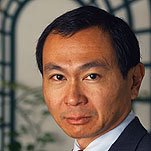What the Fukuyama?! A noted neo-conservative changes his stripes

One of the original members of the Project for the New American Century (PNAC) and a noted neo-conservative, Francis Fukuyama, recently renounced his neo-conservative ties in a New York Times Magazine essay. In essence, Fukuyama says that the original foundation for neo-conservativism devolved into an overly militaristic and interventionist approach by the Bush administration and its neo-con idealists.
"Neoconservatism, as both a political symbol and a body of thought, has evolved into something I can no longer support."
Fukuyama even goes so far as to equate today's neo-conservative doctrine as "Leninist" in its belief that "history can be pushed along with the right application of power and will." He says that their idealistic view of the U.S. as a benevolent hegemon has turned into fantasy as the harsh realities of the Iraq War, in particular, continue to reflect the pitfalls of such forceful advocacy of democracy.
The Failure of Benevolent HegemonyThe Bush administration and its neoconservative supporters did not simply underestimate the difficulty of bringing about congenial political outcomes in places like Iraq; they also misunderstood the way the world would react to the use of American power. Of course, the cold war was replete with instances of what the foreign policy analyst Stephen Sestanovich calls American maximalism, wherein Washington acted first and sought legitimacy and support from its allies only after the fact. But in the post-cold-war period, the structural situation of world politics changed in ways that made this kind of exercise of power much more problematic in the eyes of even close allies. After the fall of the Soviet Union, various neoconservative authors like Charles Krauthammer, William Kristol and Robert Kagan suggested that the United States would use its margin of power to exert a kind of ''benevolent hegemony'' over the rest of the world, fixing problems like rogue states with W.M.D., human rights abuses and terrorist threats as they came up. Writing before the Iraq war, Kristol and Kagan considered whether this posture would provoke resistance from the rest of the world, and concluded, ''It is precisely because American foreign policy is infused with an unusually high degree of morality that other nations find they have less to fear from its otherwise daunting power.'' (Italics added.)
It is hard to read these lines without irony in the wake of the global reaction to the Iraq war, which succeeded in uniting much of the world in a frenzy of anti-Americanism. The idea that the United States is a hegemon more benevolent than most is not an absurd one, but there were warning signs that things had changed in America's relationship to the world long before the start of the Iraq war. The structural imbalance in global power had grown enormous. America surpassed the rest of the world in every dimension of power by an unprecedented margin, with its defense spending nearly equal to that of the rest of the world combined. Already during the Clinton years, American economic hegemony had generated enormous hostility to an American-dominated process of globalization, frequently on the part of close democratic allies who thought the United States was seeking to impose its antistatist social model on them.
There were other reasons as well why the world did not accept American benevolent hegemony. In the first place, it was premised on American exceptionalism, the idea that America could use its power in instances where others could not because it was more virtuous than other countries. The doctrine of pre-emption against terrorist threats contained in the 2002 National Security Strategy was one that could not safely be generalized through the international system; America would be the first country to object if Russia, China, India or France declared a similar right of unilateral action. The United States was seeking to pass judgment on others while being unwilling to have its own conduct questioned in places like the International Criminal Court.
Another problem with benevolent hegemony was domestic. There are sharp limits to the American people's attention to foreign affairs and willingness to finance projects overseas that do not have clear benefits to American interests. Sept. 11 changed that calculus in many ways, providing popular support for two wars in the Middle East and large increases in defense spending. But the durability of the support is uncertain: although most Americans want to do what is necessary to make the project of rebuilding Iraq succeed, the aftermath of the invasion did not increase the public appetite for further costly interventions. Americans are not, at heart, an imperial people. Even benevolent hegemons sometimes have to act ruthlessly, and they need a staying power that does not come easily to people who are reasonably content with their own lives and society.
Finally, benevolent hegemony presumed that the hegemon was not only well intentioned but competent as well. Much of the criticism of the Iraq intervention from Europeans and others was not based on a normative case that the United States was not getting authorization from the United Nations Security Council, but rather on the belief that it had not made an adequate case for invading Iraq in the first place and didn't know what it was doing in trying to democratize Iraq. In this, the critics were unfortunately quite prescient.
The most basic misjudgment was an overestimation of the threat facing the United States from radical Islamism. Although the new and ominous possibility of undeterrable terrorists armed with weapons of mass destruction did indeed present itself, advocates of the war wrongly conflated this with the threat presented by Iraq and with the rogue state/proliferation problem more generally. The misjudgment was based in part on the massive failure of the American intelligence community to correctly assess the state of Iraq's W.M.D. programs before the war. But the intelligence community never took nearly as alarmist a view of the terrorist/W.M.D. threat as the war's supporters did. Overestimation of this threat was then used to justify the elevation of preventive war to the centerpiece of a new security strategy, as well as a whole series of measures that infringed on civil liberties, from detention policy to domestic eavesdropping.
Interestingly, the neo-cons of PNAC argued in September of 2000 that the United States needed to drastically increase military spending in order to better position itself for "American global leadership." In fact, PNAC's Rebuilding America's Defenses was, in many ways, a blueprint for ensuring the United States' own global pre-eminence and dominance in the 21st century.
That's why Fukuyama's confusion about the neo-con rush to war is a bit odd. After all, a reading of Rebuilding America's Defenses should have left little doubt that the build up and flexing of U.S. military muscle - and the enormous expenditures that go along with it - was central to the PNAC agenda. And to read Fukuyama's essay, one can't help but wonder if he's truly changed his stripes or if there's a more tacit agenda at work. Clearly, he is distancing himself from his neo-con brethren, but for what purpose? And at what price?
One would hope that Fukuyama's essay is nothing less than an open admission that the neo-con agenda is beginning to exhibit cracks in its foundation. And while it's encouraging to see that at least one noted neo-con - apparently - is viewing the world with a bit more realism, I won't be convinced that neo-conservativism in its present form is dead until we hear similar contrition from other, more prominent neo-cons.
Something tells me we may be waiting a while for that to happen.



1 Comments:
I disagree with everything you say... great site...
Post a Comment
<< Home